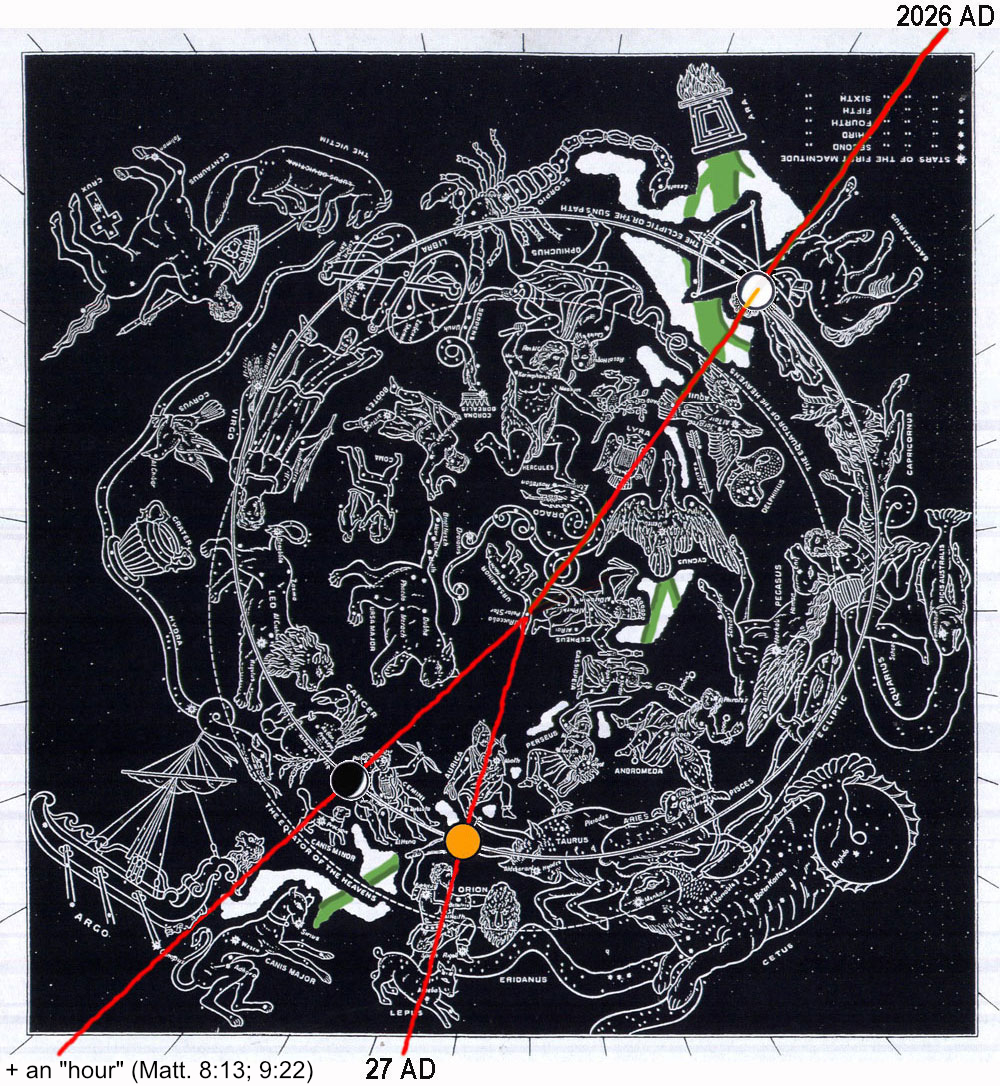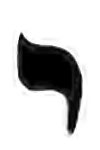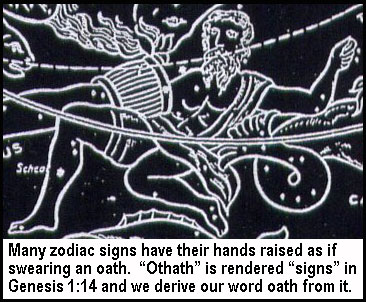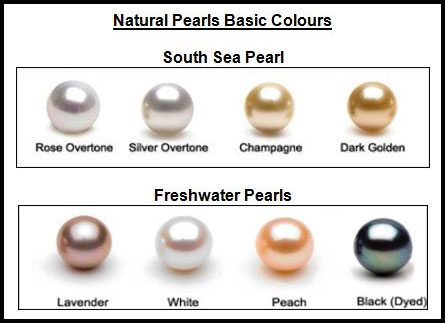
Matthew Chapter 5-7 Star Chart: Clockwise from when Jesus (Auriga) "went up into a (Milky Way) mountain; and ... was seated, (and) his (Orion & Gemini) disciples came unto him" (5:1) in 27 AD till "Blessed are ye when (Gemini) men shall revile you ... for my sake" (5:11) for yours (Sagittarius) "is the kingdom of heaven" (5:3) and Christians will (Sagittarius) "inherit the earth" (5:5) and "great is your reward in heaven" (5:12) in 2026 AD which is 1999 years or five complete laps (1800° = 360° x 5) + 199°.
|
|---|
Whosoever Shall Do and Teach the Commandments
Shall Be Called Great in the Kingdom of Heaven
5:1 And (lunar eyeball) seeing the (Gemini) multitudes, he went up into a (Milky Way) mountain: and when he (Auriga) was set, his (Gemini) disciples came unto him:
2 And he opened his (lunar) mouth, and taught them, saying,
3 Blessed are the poor in spirit (willingly poor -- Essenes give all to commune): for theirs is the kingdom of heaven.
4 Blessed are they that (black sackcloth) mourn: for they shall be comforted.
5 Blessed are the (Argo) meek: for they shall inherit the earth.
6 Blessed are they which do (lunar open mouth) hunger and thirst after righteousness: for they shall be (red radius) filled.
7 Blessed are the merciful: for they shall obtain mercy.
8 Blessed are the (solar golden) pure in heart: for they shall (lunar eyeball) see God.
9 Blessed are the peacemakers: for they shall be called the (Gemini) children of God.
10 Blessed are they which are (red radius bloodied) persecuted for righteousness' sake: for theirs is the kingdom of heaven.
11 Blessed are ye, when (Gemini) men shall (red radius) revile you, and persecute you, and shall (red radius) say all manner of evil against you falsely, for my sake.
12 Rejoice, and be exceeding (lunar crescent smiling) glad: for great is your reward in heaven: for so persecuted they the (Gemini) prophets which were before you.
13 Ye are the (lunar) salt of the earth: but if the salt have lost his savour, wherewith shall it be salted? it is thenceforth good for nothing, but to be cast out, and to be trodden under foot of (Gemini & Auriga) men. (solar is under foot) (330°)

14 Ye are the (solar) light of the world. A (solar) city that is set on an (Milky Way) hill cannot be hid.
15 Neither do (Gemini) men light a (red radius) (lunar flame) candle, and put it under a (solar yellow) bushel (basket), but on a candlestick; and it giveth light unto all that are in the (red radius) house.
16 Let your (solar or lunar) light so shine before (Gemini) men, that they may (lunar eyeball) see your good works, and glorify your (Cepheus) Father which is in heaven.
17 Think not that I am come to destroy the (two lunar stone tablets) law, or the prophets: I am not come to destroy, but to fulfil (magnifying glass).
18 For verily I say unto you, Till heaven and earth pass, one (lunar crescent) jot or one (black half of moon) tittle shall in no wise pass from the law, till all be fulfilled.

A jot is the smallest letter of the Hebrew alphabet. It is also called a yod and looks like an apostrophe when used in a word.

A tittle is a small extension of the stroke on the edge of some Hebrew letters so they can be differentiated from other letters that are similar.
19 Whosoever therefore shall break one of these least commandments, and shall teach (Gemini) men so, he shall be called the least in the kingdom of heaven: but whosoever shall do and teach them, the same shall be called great in the kingdom of heaven.
20 For I say unto you, That except your righteousness shall exceed the righteousness of the (Gemini) scribes and Pharisees, ye shall in no case enter into the kingdom of heaven.
21 Ye have (lunar ear) heard that it was (red radius) said of them (Gemini) of old time, Thou shalt not kill; and whosoever shall kill shall be in danger of the judgment:
22 But I say unto you, That whosoever is angry with his brother without a cause shall be in danger of the judgment: and whosoever shall (red radius) say to his brother, Raca, shall be in danger of the council: but whosoever shall say, Thou fool, shall be in danger of (solar) hell fire.
23 Therefore if thou bring thy gift to the (solar brass) altar, and there rememberest that thy brother hath ought against thee;
24 Leave there thy gift before the (solar brass) altar, and go thy way; first be reconciled to thy brother, and then come and offer thy gift.
25 Agree with thine (Orion) adversary quickly, whilest thou (Auriga) art in the way with him; lest at any time the adversary deliver thee to the (Pollux) judge, and the judge deliver thee to the (Argo) officer, and thou be cast into (Argo hold or lunar barred window) prison.
26 Verily I say unto thee, Thou shalt by no means come out thence, till thou hast paid the uttermost (lunar or solar) farthing.
27 Ye have (lunar ear) heard that it was (red radius) said by them of old time, Thou shalt not commit adultery:
28 But I say unto you, That whosoever (lunar eyeball) (red radius) looketh on a woman (Castor wife) to lust after her hath committed adultery with her already in his heart.
"The way to chastity is not to struggle directly with incontinent thoughts but to avert the thoughts by some employment, or by reading, or meditating on other things." -- Isaac Newton.
29 And if thy right (lunar) eye offend thee, pluck it out, and (red radius) cast it from thee: for it is profitable for thee that one of thy members should perish, and not that thy whole body should be cast into (solar) hell.
30 And if thy right (lunar crescent) hand offend thee, (red radius) cut it off, and cast it from thee: for it is profitable for thee that one of thy members should perish, and not that thy whole body should be cast into (solar) hell.
31 It hath been said, Whosoever (Pollux) shall put away his (Castor) wife, let him give her a (lunar white) (red radius pen) writing of divorcement:
32 But I say unto you, That whosoever shall put away his (Castor) wife, saving for the cause of fornication, causeth her to commit adultery: and whosoever shall marry her that is divorced committeth adultery.

33 Again, ye have (lunar ear) heard that it hath been (red radius) said by them of old time, Thou shalt not forswear thyself, but shalt perform unto the Lord thine (red radius) oaths:
34 But I (red radius) say unto you, (Orion, Castor) Swear not at all; neither by heaven; for it is God's (Cepheus) throne:
35 Nor by the earth; for it is his footstool: neither by Jerusalem; for it is the city of the great King.
36 Neither shalt thou swear by thy head, because thou canst not make one hair (lunar crescent) white or (lunar black) black.
37 But let your (red radius) communication be, Yea, yea; Nay, nay: for whatsoever is more than these cometh of evil.
38 Ye have (lunar ear) heard that it hath been said, An (lunar) eye for an eye, and a (lunar) tooth for a tooth:
39 But I say unto you, That ye resist not evil: but whosoever shall (red radius) smite thee on thy right cheek, turn to him the other also.
"One who is injured ought not to return the injury, for on no account can it be right to do an injustice; and it is not right to return an injury, or to do evil to any man, however much we have suffered from him." -- Socrates.
40 And if any man will sue thee at the law, and take away thy (lunar crescent) coat, let him have thy (lunar black) cloak also.
41 And whosoever shall compel thee to go a (red radius one way) mile, go with him twain (red radius return trip).
42 Give to him that (red radius) asketh thee, and from him that would borrow of thee turn not thou away.
43 Ye have (lunar) heard that it hath been (red radius) said, Thou shalt love thy neighbour, and hate thine enemy.
44 But I say unto you, Love your enemies, bless them that curse you, do good to them that hate you, and (Argo) pray for them which despitefully use you, and persecute you;
45 That ye may be the (Gemini) children of your (Cepheus) Father which is in heaven: for he maketh his (solar) sun to rise on the evil and on the good, and sendeth (red radius) rain on the just and on the unjust.
46 For if ye love them which love you, what reward have ye? do not even the (Gemini) publicans the same?
47 And if ye salute your (Gemini) brethren only, what do ye more than others? do not even the (Gemini) publicans so?
48 Be ye therefore perfect, even as your (Cepheus) Father which is in heaven is perfect.
6:1 Take heed that ye (Auriga) do not your (gold coin) alms before (Gemini) men, to be (lunar eyeball) seen of them: otherwise ye have no reward of your (Cepheus) Father which is in heaven.
2 Therefore when thou (Auriga) doest thine (gold coin) alms, do not sound a (red radius solar bell-end) trumpet before thee, as the (Gemini) (lunar crescent shofar) hypocrites do in the synagogues and in the (red radius) streets, that they may have glory of (Gemini) men. Verily I say unto you, They have their reward.
3 But when thou doest (gold coin) alms, let not thy (Auriga or Orion) left hand know what thy right hand doeth (red radius barrier between them hides each from the other):
"So much the raging thirst of fame exceeds
The generous warmth which prompts to worthy deeds,
That none confess fair virtue's genuine power,
Or woo her to their breast without a dower." -- Juvenal
4 That thine (solar gold coin) alms may be in secret: and thy (Cepheus) Father which (lunar eyeball) seeth in secret himself shall reward thee openly.
5 And when thou prayest, thou shalt not be as the (Orion & Auriga) hypocrites are: for they love to pray (Orion) standing in the synagogues and (Auriga) in the (red radius) corners of the streets, that they may be (lunar eyeball) seen of men. Verily I say unto you, They have their reward.
6 But thou, when thou prayest, enter into thy (Argo) closet, and when thou hast shut thy (lunar) door, (red radius) pray to thy (Cepheus) Father which is in secret; and thy (Cepheus) Father which (lunar eyeball) seeth in secret shall (solar golden) reward thee openly.
7 But when ye pray, use not (red radius monotonous) vain repetitions, as the (Gemini) heathen do: for they think that they shall be (lunar ear) heard for their much (red radius) (lunar open mouth) speaking.
8 Be not ye therefore like unto them: for your (Cepheus) Father knoweth what things ye have need of, before ye ask him.
9 After this manner therefore pray ye: Our (Cepheus) Father which art in (Zodiac) heaven, Hallowed be thy name.
10 Thy (solar golden) kingdom come, Thy will be done in earth, as it is in (the zodiac) heaven.
11 Give us this day our daily (solar golden) bread.
12 And forgive us our debts, as we forgive our (Gemini) debtors.
13 And lead us not into temptation, but deliver us from evil: For thine is the kingdom, and the power, and the glory, for ever. Amen.
14 For if ye (red radius cancel) forgive (Gemini) men their (lunar) trespasses, your heavenly (Cepheus) Father will also (red radius cancel) forgive you :
15 But if ye (red radius) forgive not (Gemini) men their (lunar) trespasses, neither will your (Cepheus) Father (red radius) forgive your (solar) trespasses.
16 Moreover when ye (lunar open mouth) fast, be not, as the (Gemini) hypocrites, of a (lunar crescent) sad countenance: for they (black ash Wednesday) disfigure their faces, that they may (lunar eyeball) appear unto (Gemini) men to fast. Verily I say unto you, They have their reward.
17 But thou, when thou fastest, (solar golden oil) anoint thine (Orion) head, and (lunar water) wash thy (Pollux) face;
18 That thou (lunar eyeball) appear not unto (Gemini) men to fast, but unto thy (Cepheus) Father which is in secret: and thy Father, which seeth in secret, shall (solar golden) reward thee openly.
19 Lay not up for yourselves (only) (solar golden) treasures upon earth, where moth and (red radius) rust doth corrupt, and where (Orion) thieves (red radius) break through and (solar golden) steal:
20 But lay up for yourselves (solar golden) treasures in heaven (also), where neither moth nor (red radius) rust doth corrupt, and where (Orion) thieves do not break through nor (solar gold) steal:
| "Thieves may break locks, and with your cash retire; Your ancient seat may be consumed by fire; Debtors refuse to pay you what they owe; Or your ungrateful field the seed you sow; You may be plundered by a jilting whore; Your ships may sink at sea with all their store: Who gives to friends, so much from fate secures; That is the only wealth for ever yours." (Mart. 5:42) |
"How ridiculous it is to promise ourselves a long life, when we are not certain of tomorrow! what folly, to stretch out and enlarge on distant hopes, saying, I will buy; I will build; I will give credit; I will call in my debts; I will sue for honours; and when I have had enough of public business, I will retire, and indulge my weary age, in repose and quiet! Believe me all things are doubtful and uncertain, even to the most happy." (Seneca epist. 101) |
"They have ever in their souls, from the gods a divine gold and silver, and therefore have no need of that which is human; and it would be profane to pollute the divine ore by mixing it with the alloy of the mortal metal?" (Plat. de rep. 3:22) "Know that nothing in life is given to man as his own." (Lucil. 27:29) |
21 For where your (solar gold) treasure is, there will your (lunar black) heart be also.
22 The light of the body is the (lunar) eye: if therefore thine eye be single, thy whole body shall be full of (solar) light.
23 But if thine (lunar) eye be evil (stingy), thy whole body shall be full of (lunar) darkness. If therefore the light that is in thee be (lunar) darkness, how great is that darkness!
24 No man can serve two masters (God and rich men): for either he will hate the one, and love the other; or else he will hold to the one, and despise the other. Ye cannot serve God and mammon.
"The more men indulge in the desire of wealth, the less will they esteem virtue; for virtue is so at variance with wealth, that supposing each to be placed at the opposite end of a balance, they would always weigh the one against the other." (Plato de rep. 8:6)
"Take no care ... for riches ... virtue does not spring from riches, but riches, and all other human blessings, both private and public, from virtue." (Plato Socr. apol. 17)
"Corroding care, and thirst for more,
Attends the still increasing store.
25 Therefore I say unto you, Take no (anxious) thought for your life, what ye shall (lunar open mouth) eat, or what ye shall (red radius) drink; nor yet for your body, what ye shall (lunar white) put on. Is not the life more than meat, and the body than (lunar white) raiment?
26 Behold the (Aquila, Lyra, Cygnus) fowls of the air: for they sow not, neither do they reap, nor gather into (red radius) barns; yet your (Cepheus) heavenly Father (red radius) feedeth them. Are ye not much better than they?
27 Which of you by taking (solar) (red radius) thought can add one cubit unto his (Orion or Gemini) stature?
28 And why take ye thought for raiment? Consider the (lunar white) lilies of the field, how they grow; they toil not, neither do they spin:

29 And yet I say unto you, That even (Cepheus) Solomon in all his glory was not arrayed like one of these.
30 Wherefore, if (Cepheus) God so clothe the (Milky Way) grass of the field, which to day is, and to morrow is cast into the (solar) oven, shall he not much more clothe you, O ye of little faith?
31 Therefore take no (anxious) thought, saying, What shall we (lunar open mouth) eat? or, What shall we (lunar open mouth) drink? or, Wherewithal shall we be clothed?
32 (For after all these things do the (Gemini) Gentiles seek:) for your heavenly (Cepheus) Father knoweth that ye have need of all these things.
33 But seek ye first the kingdom of God, and his righteousness; and all these things shall be added unto you.
34 Take therefore no (anxious) thought for the morrow: for the morrow shall take thought for the things of itself. Sufficient unto the day is the evil thereof.
"Prithee talk no more of sorrow;
To the gods belong tomorrow,
And perhaps with gracious power
They may change the gloomy hour." -- Horace
"Happy the man, and happy he alone,
He who can call today his own;
He who, secure within, can say,
Tomorrow do thy worst, for I have lived today." -- Dryden
7:1 Judge not, that ye be not judged.
2 For with what judgment ye judge, ye shall be judged: and with what measure ye mete, it shall be measured to you again.
3 And why (lunar eyeball) beholdest thou the (red radius) mote (splinter) that is in thy (Gemini) brother's (lunar) eye, but considerest not the (red radius) beam that is in thine own (Orion or Auriga) eye?
4 Or wilt thou say to thy (Gemini) brother, Let me pull out the mote (red radius splinter) out of thine (lunar) eye; and, behold, a (red radius) beam is in thine own (Orion or Auriga) eye?
5 Thou hypocrite, first cast out the (red radius) beam out of thine own (Orion or Auriga) eye; and then shalt thou see clearly to cast out the mote (red radius splinter) out of thy (Gemini) brother's (lunar) eye.
"No one sees faults clearly in himself; but if another behave ill, he will observe it." (Menand. apud Stob. 23)
"Why are you so sharp-sighted, O malicious fellow, after your neighbor's faults; while you overlook your own." (Plut. de tranq. an. 8)
"We perceive what is defective more readily in others than we do in ourselves." (Cic. de off. 1:41)
"Our neighbor's hunch upon his back is known;
But we forget what rises from our own." (Catul. carm. 22)
"While you carelessly pass by
Your own worst vices with unheeding eye,
Why so sharpsighted in another's fame,
Strong as an eagle's ken, or dragon's beam?
But know that he with equal spleen shall view,
With equal rigour shall your faults pursue.
Search your own breast and mark with honest care
What seeds of folly Nature planted there." (Hor. 1. sat. 3)
6 Give not that which is holy unto the (Canis Minor or Major) dogs, neither cast ye your (lunar or solar) pearls before (Lepus) swine, lest they trample them under their feet, and turn again and rend you.

7 Ask (Cepheus), and it shall be given you (Orion); seek, and ye shall find; knock, and it shall be opened unto you (Orion):
8 For every one that asketh receiveth; and he that seeketh findeth; and to him that knocketh it shall be opened.
9 Or what man is there of you, whom if his (Orion) son ask (solar golden) bread, will he give him a (lunar) stone?
10 Or if he ask a (Delphinus) fish, will he give him a (Drago) serpent?
11 If ye then, being evil, know how to give good gifts unto your (Gemini) children, how much more shall your (Cepheus) Father which is in heaven give good things to them that (red radius) ask him?
12 Therefore all things whatsoever ye would that (Gemini) men should do to you, do ye even so to them: for this is the (lunar tables of) law and the (Gemini) prophets.
"Heaven has not cursed me with a heart of steel,
But given the sense to pity and to feel." (Homer's Odyss. 5:188)
"I shall certainly avoid doing that myself which I deemed reprehensible in another." (Herod. 3:143)
"Be such to your parents as you would wish your children to be to you. You will then govern your anger if you treat the delinquent in the same manner as you would wish to be yourself treated in the like case." (Isoc. Orat. 1)
"The ancient magistrates of Athens and Lacedamon were far from behaving insolently in their office, but treated those who were subject to their authority in the same manner as they themselves would wish to be treated by their superiors." (Isoc. Orat. 4)
Aristotle condemns those "Who are not ashamed to inflict upon others things which they would cvonsider neither just nor expedient for themselves. They require that they should be treated with justice; but they care nothing about justice towards others." (Aristotle Polit. 7:2)
"Do as you would have others do to you." (Seneca Epist. 92)
"We never ought to behave to an adversary in such a manner as would shock ourselves, were he to behave so to us." (Quintil. 11:1)
"If you would have me weep, begin the strain
Then I shall feel your sorrows, feel your pain." -- Horace (also Cicero & Quintillian)
13 Enter ye in at the (lunar nearly closed) strait gate: for wide is the (zodiac circle opening or solar open) gate, and broad is the (red radius) way, that leadeth to destruction, and many there be which go in thereat:
14 Because strait is the (lunar nearly closed) gate, and narrow (difficult) is the (green radius) way, which leadeth unto life, and few there be that find it.
| "Choose sin -- by troops she shall before thee stand; Smooth is the track, her mansion is at hand. Where Virtue dwells the gods have placed before The dropping sweat that springs from every pore; And over the foot can reach her high abode, Long, rugged, steep, the ascent and rough the road." (Hes. oper. et dies, 285) "Intrepid virtue climbs the rough hill to praise." (Sil. Ital. 4:605) |
Plato says, "Hesiod is pointed out by the many as a man of wisdom, because he asserted that the road to wickedness is smooth, and offers itself to be traversed without difficulty, being very short." (Plat. de leg. 4:9) "Virtue's paths untrodden lie, Those paths that lead us upwards to the sky." (Hor. 3 carm. 24) |
"Tis said that virtue dwells on high, Mid rocky steeps that seek the sky; Where over a hallowed realm she holds her sway. No mortal eye her form hath met Save his, from whose heart galling sweat Breaks out, and wins to manhood's top the way." (Simonid. apud Anthol. Graec.) |
"Life is a certain long road ... full of men running, pushing eachother, labouring, resting, lying down, turning out of the path, and wandering. For the impediments and fallacies are many, some of which lead to precipices and profundities. There is one path, however, which is narrow, and straight, and rough, and is not much frequented, but which leads to the end of the journey. Weary and laborious souls, who aspire after the region to which this road conducts, who love the mysteries and predict their beauty, scarcely, and with much molestation, labour, and sweat, arrive at the desired end." (Max. Tyr. 23)
"The wise governors of the universe have decreed that nothing great, nothing excellent, shall be obtained without care and labour: they give no real good, no true happiness, on other terms." (Xen. Mem. 2:1)
"The way of virtue is for the most rugged part rugged, and but little of it smooth: therefore a good man who resolves to enter upon it and pursue it must prepare for labour and be ready to endure." (Max. Tyr. Diss. 4)
"The reply of Socrates to a vicious woman who boasted that she could entice all his disciples from him, but that he could not withdraw one of her followers from her, was -- No wonder; for you lead all by a downward path; but I persuade them to strive after virtue, and this is a steep road and little frequented." (Ael. Var. Hist. 13:31)
"Shall we think that virtue, that divine quality which alone can make mankind approach to divinity, comes to us with our existence, without courting and without care?" (Quintillius 12:2)
15 Beware of (Gemini) false prophets, which come to you in (Milky Way) sheep's clothing, but inwardly they are ravening (Canis Minor and Major) wolves.
16 Ye shall know them by their (lunar) fruits. Do men gather grapes of (lunar crescent) thorns, or figs of (lunar crescent) thistles?
17 Even so every good tree bringeth forth good (solar golden or lunar gibbous) fruit; but a corrupt tree bringeth forth (lunar crescent) evil fruit.
18 A good tree cannot bring forth (lunar crescent) evil fruit, neither can a corrupt tree bring forth good (solar golden or lunar gibbous) fruit.
19 Every tree that bringeth not forth good fruit is (lunar axe) hewn down, and cast into the (solar) fire.
20 Wherefore by their (solar or lunar) fruits ye shall know them.
"No lovely rose,
Or hyacinth, from the rude bramble grows;
Nor from a slavish and degraded breed
Can gentle words or courterous acts proceed." (Theogn. 537)
"Good does not spring from evil, any more than a fig from an olive tree. Every leaf and fruit answers its own seed: that which is good cannot degenerate: as what is fit and honorable cannot rise from what is wrong and vile, so neither can good spring from evil: for fit and good is the same thing." (Seneca epist. 87)
21 Not every one that saith unto me, Lord, Lord, shall enter into the kingdom of heaven; but he that doeth the will of my (Cepheus) Father which is in heaven.
22 Many will say to me in that day, Lord, Lord, have we not prophesied in thy name? and in thy name have cast out (Drago) devils? and in thy name done many wonderful works?
23 And then will I profess unto them, I never knew you: depart from me, ye that work iniquity.
24 Therefore whosoever (lunar ear) heareth these sayings of mine, and doeth them, I will liken him unto a wise man, which built his (red radius) house upon a (lunar) rock:
25 And the (red radius) rain descended, and the (Eridanus) floods came, and the (Milky Way) winds blew, and beat upon that (green radius) house; and it fell not: for it was founded upon a (lunar) rock.
26 And every one that (lunar ear) heareth these (red radius) sayings of mine, and doeth them not, shall be likened unto a foolish man, which built his (red radius) house upon the (Milky Way) sand:
27 And the (red radius) rain descended, and the (Eridanus) floods came, and the (Milky Way) winds blew, and beat upon that (red radius) house; and it fell: and great was the fall of it.
28 And it came to pass, when Jesus had ended these sayings, the (Gemini, etc.) people were astonished at his doctrine:
29 For he taught them as one having authority ("I say unto you"), and not as the scribes ("Rabbi XYZ says this or that.").